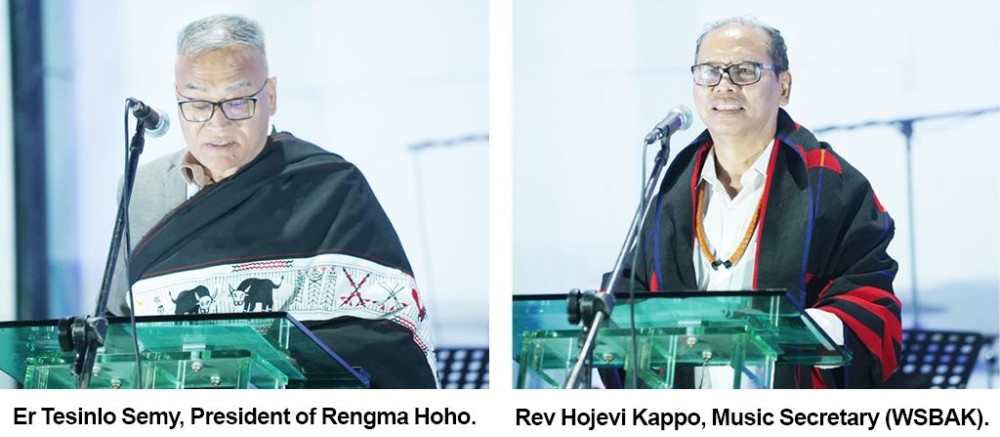
Zunheboto, November 15 (MExN): The two-day Ahuna Festival 2025 concluded on Saturday, showcasing a vibrant display of Sümi Naga culture, unity, and artistry under the theme “Bound by History, Bridging Generations.” Organised by the Sümi Hoho and hosted by the Sümi Aphuyemi Frontal Organizations, the celebration featured traditional rituals and cultural presentations.
The festivities included a grand musical evening, the Ahuna Music Concert, curated by the Sümi Music Forum. The concert held on November 14 evening, showcased a wide range of local talent.
Speaking as the special invitee at the Ahuna Music Concert, Er Tesinlo Semy, President of the Rengma Hoho, highlighted the longstanding bond of friendship and shared heritage between the Sumi and Rengma communities. He said the Ahuna Festival serves as a reminder that “gratitude and unity are at the heart of our traditions.”
Er Semy traced the historical ties between the two tribes, noting that the Sumi and Rengma once lived together in ancient settlements such as Khwenphen and Chewenyuphen. He shared that many clans from both communities originated from these early settlements and that similarities in customs, attire, and songs reflect their common ancestral roots.
He recalled oral traditions that trace Naga origins from Mongolia through China and Burma before dispersing from Makhel and Kezakenoma, forming the present-day Naga tribes. He added that history records the Rengma, Sumi, and Lotha people living together around the 7th century in Khwenphen—located between Kashanyu and Mishilimi—emphasising that he himself hails from Kashanyu, the nearest Rengma neighbour to the Sumi region.
Er Semy narrated an early 20th-century story of cultural harmony, when Sumi families led by Keyazü visited Kashanyu village. Welcomed warmly by Rengma leaders, the Sumi settlers were later invited to live within the Rengma Reserved Forest in a gesture of trust and brotherhood. As a mark of gratitude, Keyazü presented the Rengma village chief with a warrior’s sash and spear. The visit concluded with a night of songs, dances, and celebration—symbolising unity between the two tribes.
Drawing parallels between the Sumi Ahuna and the Rengma Ngada festivals, he said both celebrations share the same essence of thanksgiving, prosperity, and communal harmony. Though celebrated separately today, he noted that these festivals reflect a time when both communities rejoiced together after the harvest.
Er Semy described the evening’s musical concert as a continuation of that shared spirit. “Music lifts our hearts, heals divisions, and brings people together,” he said, urging both tribes to preserve the bond of love, respect, and shared heritage for future generations. He concluded by giving thanks to God for the enduring gift of brotherhood between the Sumi and Rengma people.
Young musicians urged to embrace cultural roots
Rev Hojevi Kappo, Music Secretary (WSBAK), delivered a address at the Music Concert as part of the Ahuna Festival, saying that his calling to music comes from God and that artistic recognition brings weighty responsibility.
Receiving praise and an honour on the festival night, Rev Kappo told the packed audience that while he is grateful to be honoured, the award “is a responsibility — you are honouring me but I feel that I am more burdened.” He said he was “called to Music ministry by God” and that he always strives “not to misuse the gift.”
Rev Kappo traced his creative roots to faith, landscape and tradition. “The source of my songs is — God, Nature & our cultures,” he said, explaining that as a writer he thinks deeply about the community’s roots and past lifestyles and that his work intentionally seeks to bring the values of Sümi culture and tradition to the fore.
As a composer he said he leans on traditional tunes, and as an innovator he highlighted the use of natural instruments that have direct links to local culture. He also explained the meaning behind the term “Nagagenous” — “Naga indigenous (Nagami ye aghakütsami ke)” — and thanked Nagagenous members for their sacrifices.
Rev Kappo shared the festival’s chosen theme, “Stories to tell (story of our culture and the gospel),” and performed or referenced several songs close to his heart, including Khristmas is best in my village, Kashopapu, Slimi and Süpumi. He urged younger musicians to stay true to their roots: “Do not be a Khecheli kupo musician,” he cautioned, appealing for authenticity and cultural fidelity.
Highlighting the global reach of cultural music, Rev. Kappo said his tour to several countries was made possible because of the cultural songs he champions, and closed by expressing gratitude to those who have supported the work.
The event was chaired by Otova Swu, Vice President of Sümi Hoho, and hosted by Christina Yeptho, Miss Dimapur 2025, along with Atto Achumi. The concert opened with a prayer by Rev Fr Paul Inashe, Parish Priest of Lazami, and featured performances by Nguvili Assumi, Kito Swo, Grace Swu, Inito Meren Swu, Lovi Aye, Heli Wotsa, Inaho Swu, Timeless Band, and The Noisy Neighbour.






